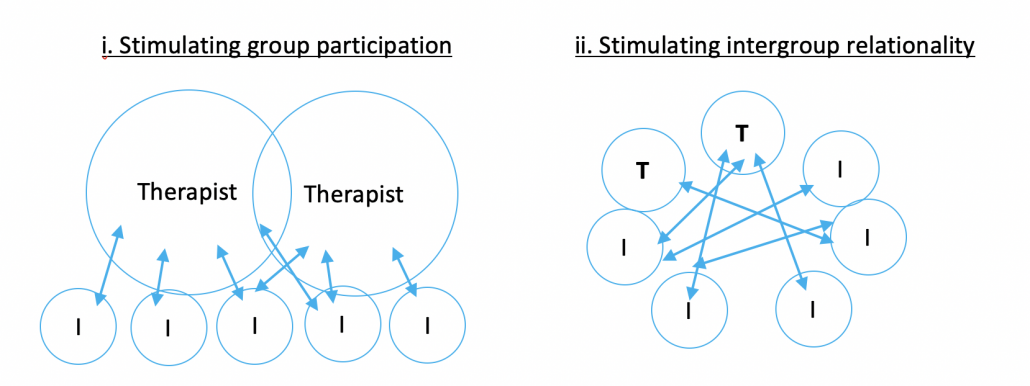There is emerging consensus in the field of psychotherapy that relationships matter more than techniques. Over 60 years of empirical data of clinical practice, insights in quantum physics, contemplative and complexity sciences all back this up. How can we make sense of these findings and adapt our clinical interventions accordingly to harness the breadth of potential therein to increase nervous system resiliency, an empowered sense of self and interpersonal connection and belonging? NeuroSystemics was conceived precisely for this purpose.
One of the key contributions of NeuroSystemics to the field of clinical practice is to provide a meta-model which incorporates maps and tools for increasingly complex practice settings: (i) mental skills, (ii) 1:1 sessions and (iii) group therapy. A number of systemic principles can be applied to each of these practice settings, and the quality of relationship is one of those essential factors. The relational stance fractally reiterates itself in self-similar expressions in each of these settings and needs to be facilitated accordingly. A brief description of how relational qualities can be nourished to support a successful therapeutic outcome will now be given.
1. Mental skills: relating to experience & within experience
Since the earl 20th century, science has experienced a radical paradigmatic transition from linear to non-linear dynamics. Einstein’s special theory of relativity, followed by Heisenberg’s uncertainty principle and Gödel’s incompleteness theorems, have shaken our Newtonian understanding of reality as a solid and objective experience. These recent insights start to account for the impact of the observer, the experimenter, consciousness itself.
Contemplative sciences, emerging from the most subtle meditative inquiry into the nature of reality, provide a similar conceptual framework whereby any and all experience are fundamentally empty of inherent existence. They arise as a result of causes and conditions, imbedded in infinite interdependent networks of matter and mind. Consciousness is one of these conditions which contribute to the arising of experience on a moment-to-moment level. Therefore, the quality of consciousness, that is, the way in which one’s direct experience is apprehended, the way consciousness relates to the object of experience, significantly influences the way the experience manifests.
As an initial practice of mental training, NeuroSystemics thereby brings a lot of emphasis to cultivating a whole spectrum of skillful qualities of mind such as receptive, gentle compassionate on one end (colloquially understood ‘being’), and more participative, assertive and controlling attitudes (colloquially understood ‘doing’). Being controlling is often understood as a problematic stance and something we should strive to let go of. However, upon careful examination of our intrapsychic experience, it will become clear that there are moments when we feel overwhelmed, and it simply is not possible (and therefore not desirable) to attempt maintaining receptivity. Since no experience has inherent existence, the fundamental skill to learn is adaptiveness, not a reified mental attitude. This concords with Darwin’s understanding of fitness and adaptiveness as being our most essential forms of intelligence. This means that we should build skills on the whole spectrum of relational dispositions, and engage with our experience adaptively to provide the best possible regulatory and emancipatory outcome.

Once the appropriate attentional relationship to experience is achieved, further mental skills can be developed to progressively weave associative networks between the different dynamics of our experience. For example, we help to form interdependent links between different sensations in the body (shifting from local to more global physiological awareness), between the body and feelings, extending further to include cognitive processes and content.
Evolution can be defined as increasing orderly complexity. When training consciousness, it is possible to further this developmental trajectory by complexifying the associations between stimuli, to reach infinitely inclusive state of mind. These highly coherent and organizing states strengthen resiliency, upregulate positive affect and build durable well-being. This is where a previously overwhelming experience, such as trauma, can be transformed into a movement of post-traumatic growth.
In sum, NeuroSystemics encourages the strengthening of relational qualities to experiences, starting with the attitude of consciousness itself. It gently supports more complex interdependent patterns weaving each arising contents of experience (sensations, feeling, cognitions) into an integrative systemic web and reinforcing attentional stay-power and resiliency.
2. 1:1 Sessions: relating to the client & their daily life
Clinical practice has enjoyed over 60 years of empirical research. We are now able to discern some of the most important psychotherapeutic success factors. The common factors’ research paradigm, based on rigorous statistical analyses, emphasizes the importance of the relationship between the therapist and the client more so even than the therapeutic technique. This means that one of the main active ingredients to engage in at first, is to build a sense of trust and appreciation between the therapeutic environment. Rogers’ humanistic triad of empathy, unconditional positive regard and congruence are essential to actualize this potential.
Secondly, as a therapeutic contract, the common factors’ approach encourages the setting of clear goals and tasks to achieve these goals. This fosters a co-creative and participative dynamic within the client, seeking to strengthen and empower the clients’ intrinsic self-organisational impulses. This is key because, aside from the relational qualities between therapist and client, the other array of success factors pertain to extra-therapeutic dynamics. The clients’ activities and environment have great influence on their building of resiliency and healing.

Relational emphases in 1:1 sessions
As a consequence, NeuroSystemics emphasizes not only the trusting and compassionate therapist-client relationship, but also the relations that the client can make between experiences in therapy. As much emphasis is given to therapeutic experiences as to the client’s transferential assimilation of these into their daily life and relationships outside of therapy. Therapeutic considerations therefore extend much beyond the clinical hour, and webs of interdependent associations are weaved and integrated.
Group therapy: multi-directional relationships
Neurophysiological research has provided key insights to. appreciate the power of being in safe, trusting and enjoyable relationships. Cohen and Sbarra’s social baseline theory demonstrates the ways in which friendly social connection is perceived as a bioenergetic resource, reducing the quantity of effort required to accomplish tasks if friends were not present. Through fMRI research combining neuroanatomic and social psychology they found that the proximity of friends reduces neuroaffective, neurocognitive and neuromotor energy expenditures. This means it is easier to regulate emotions and behaviour in the presence of good company. By forming a rigorous alliance with clients, therapists can help reduce the required nervous system capacity to access the freeze states and release the stored charge in a gentle, safe and even enjoyable fashion.
Also, Porges’ polyvagal theory explains the ways in which a nourishing social contact will, to an inversely proportionate degree, reduce an individual’s tendency to experience states of fight, flight and freeze.

As a consequence, it is of prime importance to build a strong alliance (as described in 1:1 sessions above) and support clients’ participation and engaging socially. Initially, therapists will (i) stimulate individual participation and as safety grows, (ii) exchanges will occur directly between group members. The web of relationships grows to build a net of connections which begins to replace the role of therapists in holding the group safety and development. This second stage maximizes participation, intimacy and social embeddedness. It also fosters a more democratic and non-hierarchical distribution of power and influence in the group.
Conclusion: Integrating a multi-dimensional perspective
NeuroSystemics provides a multi-dimensional framework to harness the power of relationships in mental training, 1:1 sessions and group therapy. Quantum and contemplative sciences describe the malleability of experience through the qualities of perceptual consciousness. Mental training therefore involves the cultivation of a whole spectrum of relational attitudes in order to best adapt to emerging experiences. Practically, this may mean relating to one’s experience with assertiveness when sensing the possibility of overwhelm, and applying greater receptivity when there is greater balance.
In 1:1 sessions, the therapist will journey with their clients to co-create relational safety. This offers possibilities to deepen the clients’ own capacity and skills to embody and integrate therapeutic experiences into their daily life. This 2-step relational development has shown to account for over 70% of the variance for psychotherapeutic success, and NeuroSystemics 1:1 sessions have been conceived based on this structure.
Group processes provide a rich context of practice to build on our evolutionary momentum to increase orderly complexity. Whether through the individual inquiry, active empathy and step-by-step building of trust, or through the receptive empathy and facilitating direct interactions between members, relationality is has center focus in this context of praxis. In the same way. that the physiological organism breathes in and out, the oscillation between these two forms of relational engagements offer unique emergent possibilities of both belonging and individuation.



